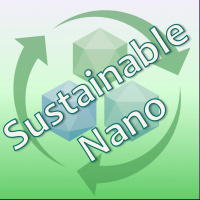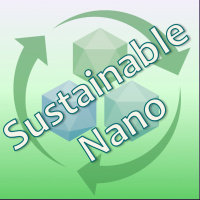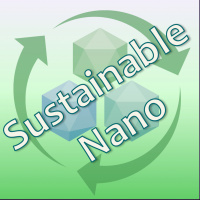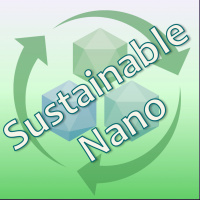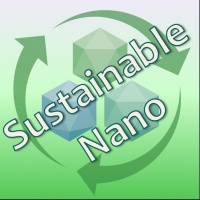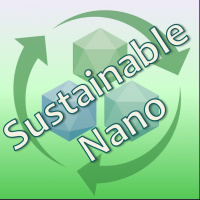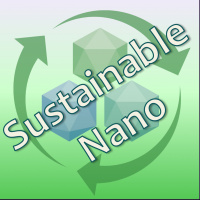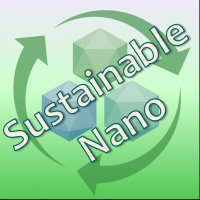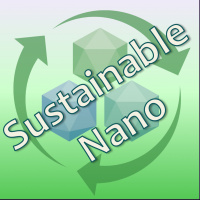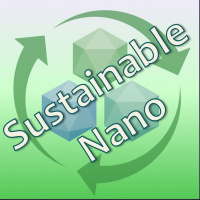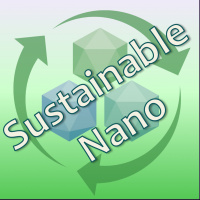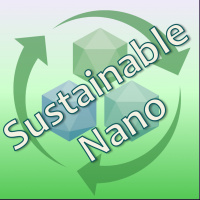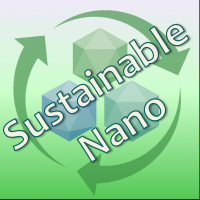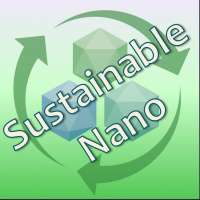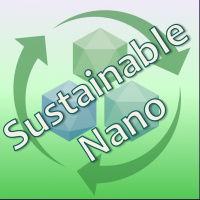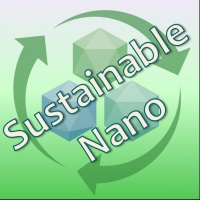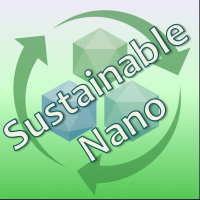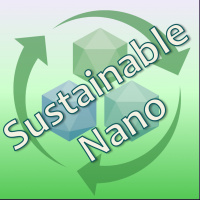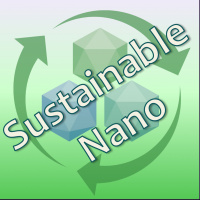Informações:
Sinopse
Curious about nanotechnology, sustainability, and life in science? The Sustainable Nano podcast is produced by the Center for Sustainable Nanotechnology, a chemistry research center funded by the U.S. National Science Foundation.
Episódios
-
Ep 27. The Constant Loop: How Nanoparticles and the Environment Affect Each Other
02/11/2018 Duração: 21minLithium Cobalt Oxide (LCO) is an important nanomaterial used in batteries, but little is known about what happens when it gets exposed to the environment. In this episode we interview Center for Sustainable Nanotechnology graduate student Liz Laudadio, who was the first author on a recent paper about what happens to LCO when it gets exposed to phosphates in water. We discuss why phosphates are important and next steps to understanding potential environmental impacts of nanomaterials: "It's a constant loop of, How do nanoparticles affect the environment? How does the environment affect nanoparticles?" Left: Liz Laudadio working with an X-ray photoelectron spectrometer (XPS), which was used in this study to quantify how much phosphate adsorbed to LCO nanoparticles. Center/Right: Transmission Electron Microscope images of LCO nanosheets (from Laudadio et al. 2018, used with permission from the American Chemical Society) Want more podcast episodes? You can find them all on our podcast page, or you ca
-
Ep 26. Nanomaterials and Renewable Energy: From Solar Panels to Machine Learning
19/10/2018 Duração: 21minHow are photons like toddlers? And what does that have to do with solar energy? Dr. Jillian Buriak has been researching nanomaterials and renewable energy for over a decade, including work to improve solar panel technology. In this first episode of the Sustainable Nano Podcast's third season, we interview Dr. Buriak, who is a Professor of Chemistry at the University of Alberta and Canada Research Chair of Nanomaterials for Energy, about her research, career path, and even some advice for junior scientists. Dr. Jillian Buriak (left) and the cover illustration of single-crystal nickel−iron oxide nanoparticles of different shapes, based on an article from her lab (right, from Bao et al. 2014. (used with permission from the American Chemical Society) Want more podcast episodes? You can find them all on our podcast page, or you can subscribe on iTunes or Stitcher. #### **ABOUT THIS EPISODE** Related links: Dr. Jillian Buriak: lab page and Twitter Canada Research Chair in Nanomaterials Covestro Lectureship Bau
-
Season 3 Preview
09/10/2018 Duração: 02minIt's Season 3 of the Sustainable Nano Podcast! Here's a quick preview of a few of our upcoming episodes, including interviews with Dr. Mary Kirchhoff, Alvin Chang, & Dr. Jillian Buriak. Sustainable Nano Season 3 is on the way! Want more podcast episodes? You can find them all on our podcast page, or you can subscribe through Apple Podcasts or Stitcher. #### **ABOUT THIS EPISODE** Related links: Center for Sustainable Nanotechnology National Nanotechnology Day (October 9) Producer/Host: Miriam Krause Music: PC III
-
Ep 25. Finding the Next Fix for the World's Problems: More from the Connecticut Agricultural Experiment Station
28/06/2018 Duração: 23minIn the second interview from our visit to the Connecticut Agricultural Experiment Station, graduate students Natalie Hudson-Smith and Jaya Borgatta interview Dr. Wade Elmer, Chief Scientist for the Department of Plant Pathology and Ecology. They discuss everything from everyday garden fertilizers to cutting-edge nanoparticle experiments on watermelon. Dr. Wade Elmer with eggplant seedlings at the Connecticut Agricultural Research Station. (image by Jan Ellen Spiegel, used with permission from Undark Magazine) Want more podcast episodes? You can find them all on our podcast page, or you can subscribe on iTunes or Stitcher. #### **ABOUT THIS EPISODE** Related links: Dr. Wade Elmer The Connecticut Agricultural Experiment Station Undark magazine: In Connecticut, a Nanoscale Agricultural Experiment With Global Potential by Jan Ellen Spiegel Center for Sustainable Nanotechnology Interviewee: Dr. Wade Elmer Interviewers: Natalie Hudson-Smith and Jaya Borgatta Producer/Host: Miriam Krause Music: Ketsa
-
Ep 24. Using MRI technology to study nanoparticles
16/04/2018 Duração: 23minHow do we "see" nanoparticles when they're too small to view with a normal microscope? In this episode we interview Kelly Zhang, a graduate student in the Center for Sustainable Nanotechnology who recently published a paper about a new way to use NMR technology (like MRI for chemistry) to study the behavior of molecules that form a shell on diamond nanoparticles. We also talk about how watching anime as a kid inspired Kelly to become a chemist. Kelly Zhang and a model of a polymer-wrapped diamond nanoparticle like the ones studied in her recent article (image adapted courtesy of Author Choice license from the American Chemical Society) Want more podcast episodes? You can find them all on our podcast page, on spotify, or you can subscribe on iTunes or Stitcher. #### **ABOUT THIS EPISODE** Related links: Kelly Zhang Zhang Y., Fry C., Pedersen J., & Hamers R. Dynamics and Morphology of Nanoparticle-Linked Polymers Elucidated by Nuclear Magnetic Resonance. Analytical Chemistry, 2017, 89(22) 1239
-
Ep 23. From Worm Genetics to Chocolate Cake: Art and Science with Dr. Ahna Skop
08/02/2018 Duração: 30minWhat does food blogging have to do with genetics research? In this episode, we talk with Dr. Ahna Skop, an associate professor of Genetics at the University of Wisconsin-Madison, about how art, science, and cooking intersect, as well as some of the benefits and challenges she has experienced being dyslexic. Artwork depicting C. Elegans (left) and a cake showing cell division (right) (images courtesy of Ahna Skop) Want more podcast episodes? You can find them all on our podcast page, or you can subscribe on iTunes or Stitcher. C. Elegans artwork in the style of Miro (image courtesy of Ahna Skop) #### **ABOUT THIS EPISODE** Related links: Dr. Ahna Skop - Skop Lab page, Foodskop blog, Twitter, video of NAS Colloquium talk C. Elegans Smitten Kitchen food blog Dr. Skop's Mapo Tofu recipe Center for Sustainable Nanotechnology Interviewee: Dr. Ahna Skop Producer/Host: Miriam Krause Music: Ketsa
-
Ep 22. On Thin Films and Nobel Prizes: Margaret Schott Profiles Katharine Burr Blodgett
20/12/2017 Duração: 24minAt last summer's American Chemical Society national meeting, Dr. Margaret Schott of Northwestern University took the unusual step of giving her history division presentation as her subject, Dr. Katharine Burr Blodgett. In this episode we interview Dr. Schott about her own path in life and chemistry, as well as that of Dr. Blodgett, including the debate about whether this pioneer of thin film technology was overlooked for a Nobel Prize. (Katharine Burr Blodgett (left, image from the Smithsonian) and Margaret Schott (right, image from Northwestern University)) Want more podcast episodes? You can find them all on our podcast page, or you can subscribe on iTunes or Stitcher. #### **ABOUT THIS EPISODE** Related links: Dr. Margaret Schott Dr. Katharine Burr Blodgett American Chemical Society Division of the History of Chemistry Profile of Sir Fraser Stoddart Dr. Irving Langmuir Center for Sustainable Nanotechnology Interviewee: Dr. Margaret Schott Interviewer: Liz Laudadio Producer/Host: Miriam Krause Music: K
-
Ep 21. Quantifying Effects of Gender Bias: There's an App for That
30/11/2017 Duração: 21minDoes gender bias matter? You can see for yourself thanks to an interactive app created by software engineer Penelope Hill at doesgenderbiasmatter.com. In this episode, we interview Penelope about what prompted her to create the app, some of the research behind it, and a few of the ways people in science and technology fields are working to overcome bias. (Penelope Hill is the software engineer behind doesgenderbiasmatter.com.) Want more podcast episodes? You can find them all on our podcast page, or you can subscribe on iTunes or Stitcher. #### **ABOUT THIS EPISODE** Related links: Penelope Hill on LinkedIn and Twitter Does Gender Bias Matter? App "Melinda Gates: The Tech Industry Needs to Fix Its Gender Problem—Now" by Gillian White in The Atlantic "White House women want to be in the room where it happens" by Juliet Eilperin in The Washington Post Avoiding Gender Bias in Reference Writing ASU handout Small Pond Science blog post by Terry McGlynn about the gender bias in a recent list
-
Ep. 20 Dr. Gro Harlem Brundtland and the Definition of Sustainability
03/11/2017 Duração: 32minWhat does "sustainability" mean? Dr. Gro Harlem Brundtland is famous for serving three terms as the Prime Minister of Norway and chairing the World Commission on Environment and Development -- the Brundtland Commission -- which defined sustainable development as "development that meets the needs of the present without compromising the ability of future generations to meet their own needs." In this episode we discuss Dr. Brundtland's autobiography, Madam Prime Minister, her life and accomplishments, and her contribution to our modern understanding of sustainability. (Dr. Brundtland at a conference in 2014 (image by Luiz Munhoz)) Want more podcast episodes? You can find them all on our podcast page, or you can subscribe on iTunes or Stitcher. #### **ABOUT THIS EPISODE** Related links: Report of the World Commission on Environment and Development: Our Common Future (1987) Madam Prime Minister - autobiography by Gro Harlem Brundtland (2002) Center for Sustainable Nanotechnology Interviewee
-
Ep. 19 Scientists and Impostor Syndrome: Can We Do Anything About It?
20/10/2017 Duração: 29minYou may have heard of "impostor syndrome" or "imposter phenomenon," when perfectly competent people have the feeling that they don't belong or are faking it in their professional lives. It can lead sufferers to hold back their ideas and self-reject from opportunities, and it is surprisingly common among high-achieving people. In this episode, we talk with Dr. Valerie Young, an expert on impostor syndrome with both research and personal experience. She discusses one common factor across all people who experience impostor syndrome, and three things you can do about it if you experience the phenomenon yourself. (Dr. Valerie Young is an expert on imposter syndrome and an award-winning author.) Want more podcast episodes? You can find them all on our podcast page, or you can subscribe on iTunes or Stitcher. #### **ABOUT THIS EPISODE** Related links: Dr. Valerie Young on Twitter @ValerieYoung Dr. Young's Impostor Syndrome website Princeton professor's CV of failures "The Fraud Police&quo
-
Ep 18. Why Do We Care About Emerging Contaminants?
05/10/2017 Duração: 17minAs the Director of the Great Lakes Genomics Center in the School of Freshwater Sciences at the University of Wisconsin-Milwaukee, Professor Rebecca Klaper researches emerging contaminants such as nanomaterials and pharmaceuticals and how they affect freshwater organisms. In this episode we interview Dr. Klaper about the future of emerging contaminants and how her work relates to the development of sustainable nanomaterials. (L: Rebecca Klaper is the Director of the Great Lakes Genomics Center in the School of Freshwater Sciences at the University of Wisconsin-Milwaukee. R: Zebrafish are often used in toxicology research (image from Oregon State University.) Want more podcast episodes? You can find them all on our podcast page, or you can subscribe on iTunes or Stitcher. #### **ABOUT THIS EPISODE** Related links: Professor Rebecca Klaper EPA Scientist Weighs Emerging Contaminants About the National Exposure Research Laboratory (NERL) Environmental Defense Fund Our Stolen Future Using Gene Expression to Lear
-
Ep 17. Putting Science to Work for Society: A Visit to the Connecticut Agricultural Experiment Station
22/09/2017 Duração: 30minChemistry at the Connecticut Agricultural Experiment Station ranges from testing how nanoparticles help plants grow to determining what kind of poison was placed in someone's coffee. In this episode, we interview Dr. Jason White, Vice Director of Analytical Chemistry at the CAES and our newest collaborator in the Center for Sustainable Nanotechnology. (Dr. Jason White planting eggplants at the Connecticut Agricultural Research Station. (image by Jan Ellen Spiegel, used with permission from Undark Magazine)) Want more podcast episodes? You can find them all on our podcast page, or you can subscribe on iTunes or Stitcher. #### **ABOUT THIS EPISODE** Related links: Dr. Jason White The Connecticut Agricultural Experiment Station Undark magazine: In Connecticut, a Nanoscale Agricultural Experiment With Global Potential by Jan Ellen Spiegel Michael Crichton's novel Prey Center for Sustainable Nanotechnology Interviewee: Dr. Jason White Interviewers: Natalie Hudson-Smith and Jaya Borgatta Producer/Host: Miriam
-
Ep 16. Maybe Not the Next Industrial Revolution? Societal & Ethical Implications of Nanotechnology
19/05/2017 Duração: 25minA lot has changed in the last 10-15 years about our hopes and fears around nanotechnology. Ira Bennett and Jameson Wetmore are professors in the Center for Nanotechnology in Society at Arizona State University, and in this episode of the Sustainable Nano podcast we interview them about the complexities of understanding the ethical and societal implications of brand new innovations like nanotechnology. (Dr. Ira Bennett, Dr. Jamey Wetmore, and the ASU Center for Nanotechnology in Society) Want more podcast episodes? You can find them all on our podcast page, or you can subscribe on iTunes or Stitcher. #### **ABOUT THIS EPISODE** Related links: Dr. Ira Bennett & Dr. Jamey Wetmore Arizona State University Center for Nanotechnology in Society National Nanotechnology Coordinated Infrastructure Sustainable Nano blog post: "How Perceived Fears May Influence Companies’ Labeling of Nanoparticles" by Ese Ehimiaghe The Federal Register (opportunities for public comment) New York Times article: "Scie
-
Ep 15. The Art of Beehives, Foam, & Bubbles: An Interview with Peter Krsko
31/03/2017 Duração: 27minArtist Peter Krsko uses his background in physics and materials science to study and communicate about nature. He is described as a "bioinspired artist whose approach combines science and art, participatory, interactive and community arts, and play with hands-on education." On this episode of the podcast, we interview Dr. Krsko about art, science, community building, and spending this semester as Artist in Residence at the UW-Madison Arts Institute's Interdisciplinary Arts Residency Program. (images courtesy of Peter Krsko) Want more podcast episodes? You can find them all on our podcast page, or you can subscribe on iTunes or Stitcher. #### **MORE PHOTOS (all courtesy of Peter Krsko)**  Students (left) working on understanding the cone geometry of bergamot seeds (right) A model of a sculpture (left) inspired by the structural colors of peacock feathers (right) Community involvement in painting a mural #### **ABOUT T
-
Ep 14. What Does Nanotechnology Have to Do With Renewable Car Tires?
15/03/2017 Duração: 15minWhat if car tires could be made from renewable resources instead of petroleum? In this episode of the podcast, we interview Dr. Paul Dauenhauer, part of a research team from the Center for Sustainable Polymers who have developed a new chemical process to make isoprene (one of the key ingredients in car tires) from biomass such as grass or corn. (images from Paul Dauenhauer & Pixabay) Want more podcast episodes? You can find them all on our podcast page, or you can subscribe on iTunes or Stitcher. ABOUT THIS EPISODE Related links: Dr. Dauenhauer's lab page and Twitter Newsweek article - New Eco-Friendly, Renewable Tires Stretch the Boundaries of Rubber Production TV news videos - WCCO 4 and KARE 11 WTIP Radio interview - U of MN researchers develop new technology to make car tires from trees & grasses University of Minnesota press release - Researchers invent process to produce renewable car tires from trees, grass ACS Catalysis article by Abdelrahman et al. - Renewable Isoprene by Sequential Hydrog
-
Ep 13. Communicating About Science with 'Lab Girl' Author Hope Jahren
28/02/2017 Duração: 25minDr. Hope Jahren is a geobiologist who studies fossil organisms and the global environment, and is also the New York Times-bestelling author of the memoir Lab Girl. In this episode of the podcast, we interview Dr. Jahren about communicating science with the public, the joys and challenges of writing academic articles, and her thoughts on sexism in science. (images by Andrea Kamphuis & Gadini) Want more podcast episodes? You can find them all on our podcast page, or you can subscribe on iTunes or Stitcher. ABOUT THIS EPISODE Related links: Dr. Jahren's lab page and Twitter NPR interview - 'Lab Girl': An Homage To The Wonders Of All Things Green New York Times review - ‘Lab Girl,’ Hope Jahren’s Road Map to the Secret Life of Plants Time interview - Hope Jahren on Plants, Mud Manicures and Science's Woman Problem Center for Sustainable Nanotechnology Interviewee: Prof. Hope Jahren Interviewer: Natalie Hudson-Smith Producer/Host: Miriam Krause Music: Ketsa, Kai Engel, & Evgeny Grinko
-
Ep 12. Making Sustainable Nanoparticles From Plants
14/02/2017 Duração: 20minNanoparticles are widely used in a variety of technologies, and some researchers are looking for ways to make those nanoparticles more environmentally friendly. In this episode of the podcast, we interview Dr. Mike Curry about his research making nanoparticles from cellulose, a very common molecule found in plants. Dr. Mike Curry and a network of cellulose nanofibers (nanocellulose image by Qspheroid4) Want more podcast episodes? You can find them all on our podcast page, or you can subscribe on iTunes or Stitcher. ABOUT THIS EPISODE Related links: Dr. Curry's lab page Sustainable Nano blog posts about carbon nanotubes: bicycles, water purification, fire retardant Gizmodo article by Jamie Condliffe on 7 Incredible Uses for Nanocellulose Center for Sustainable Nanotechnology Interviewee: Prof. Mike Curry Producer/Host: Miriam Krause Music: Ketsa
-
Spring 2017 Teaser
24/01/2017 Duração: 01minWe're back from winter break and preparing a fantastic batch of podcast episodes for spring 2017! Over the next few months we'll be featuring interviews with Dr. Hope Jahren and Dr. Mike Curry, plus a profile of Dr. Gro Harlem Brundtland, and much more. Stay tuned! 2017 is here! (image adapted from Vector Open Stock)
-
Ep 11. When Artists and Scientists Collaborate
20/12/2016 Duração: 18minArt and science are often though of as completely separate pursuits, but what happens when artists and scientists actually talk to each other? In this episode of the podcast, we interview Dr. Cathy Murphy about her experiences inviting art students to spend time in her chemistry lab at the University of Illinois Urbana-Champaign. Painting by Leah Guadagnoli, inspired by nanocrystal waste! (courtesy of Cathy Murphy) Some housekeeping news: Over the winter break, we will be moving the podcast to a new host. We'll still link to each episode here on the blog, and we hope there will be minimal (or zero!) disruption for listeners. However, if you subscribe to the podcast on iTunes, there is a chance you will need to re-subscribe next month. We'll post updates as we find out more! Meanwhile if you're want to catch up on earlier podcast episodes, you can find them all on our podcast page, or you can subscribe on iTunes or Stitcher. You can also find us on the National Science Foundation's Science360 Radio network.
-
Ep 10. Why Were Plastic Mirobeads Banned? Marine Debris and Sustainable Plastics
06/12/2016 Duração: 19minPlastic debris in our water is a huge pollution problem, and just one source of that pollution is the tiny microbeads that have been widely used in personal care products. In this episode of the podcast, we interview Dr. Richard Thompson, a Professor of Marine Biology at Plymouth University and an expert on the effects of plastic debris in the marine environment. We discuss the recent federal ban on microbeads and what consumers can do to be more sustainable in our day-to-day use of plastics. Plastic microbeads (image by MPCA photos) Want more podcast episodes? You can find them all on our podcast page, or you can subscribe on iTunes or Stitcher. You can also find us on the National Science Foundation's Science360 Radio network. ABOUT THIS EPISODE Related links : Marine Debris: Are There Solutions to this Global Environmental Problem? - video of a presentation by Dr. Thompson at the Global Wave Conference H.R.1321 - Microbead-Free Waters Act of 2015 Ban on Microbeads Proves Easy to Pass Through Pipelin

